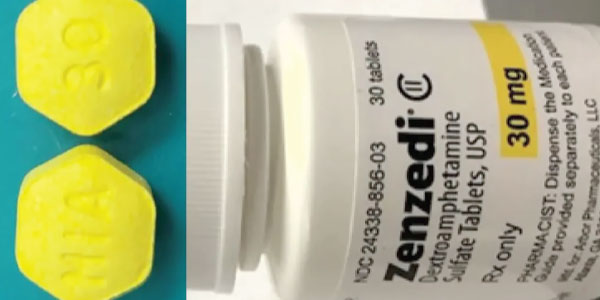
Azurity Pharmaceuticals is withdrawing from the market lot No. F230169A of Zenzedi, a medication used for helping to treat ADHD and narcolepsy, CNN and other sources have reported.
The recall was made “after incorrect pills were found in a package of the drug,” CNN stated.
Issued Jan. 24, Azurity’s recall notice stated the lot was being recalled after a Nebraskan pharmacist had found antihistamine tablets in a bottle with a Zenzedi label, according to CNN. The antihistamine tablets reportedly contained the sedative carbinoxamine maleate.
“Patients who unknowingly consume carbinoxamine could experience adverse events which include, but are not limited to, drowsiness, sleepiness, central nervous system … depression, increased eye pressure, enlarged prostate urinary obstruction and thyroid disorder,” the notice stated.
People with ADHD and narcolepsy who unknowingly take the antihistamine “run the risk of accidents or injury” because of carbinoxamine-induced sedation, the notice also stated.
Azurity claimed no serious injuries had been reported regarding the swap of medications, according to CNN. Still, consumers with the recalled medicine are advised to immediately return it to their pharmacy “and contact their health care provider if they have any bad reactions to the drug,” the news agency stated.
Se retira del mercado un lote de medicamentos para el TDAH y la narcolepsia tras una confusión
Azurity Pharmaceuticals está retirando del mercado el lote número F230169A de Zenzedi, un medicamento utilizado para ayudar a tratar el TDAH y la narcolepsia, reportaron CNN y otras fuentes.
El retiro del mercado se realizó “después de que se encontraron píldoras incorrectas en un paquete del medicamento”, afirmó CNN.
Emitido el 24 de enero, el aviso de retirada de Azurity indicaba que el lote estaba siendo retirado del mercado después de que un farmacéutico de Nebraska encontrara pastillas de antihistamínico en un frasco con una etiqueta Zenzedi, según el aviso. Las tabletas de antihistamínico contenían el sedante maleato de carbinoxamina.
“Los pacientes que consumen carbinoxamina sin saberlo podrían experimentar eventos adversos que incluyen, entre otros, somnolencia, depresión del sistema nervioso central, aumento de la presión ocular, agrandamiento de la próstata, obstrucción urinaria y trastorno de la tiroides”, decía el aviso.
Las personas con TDAH y narcolepsia que toman el antihistamínico sin saberlo “corren el riesgo de sufrir accidentes o lesiones” debido a la sedación inducida por la carbinoxamina, afirma también el aviso.
Azurity afirmó que no se habían reportado lesiones graves relacionadas con el intercambio de medicamentos, según CNN. Aún así, se recomienda a los consumidores que tengan el medicamento retirado que lo devuelvan inmediatamente a su farmacia “y se comuniquen con su proveedor de atención médica si tienen alguna reacción adversa al medicamento”, afirmó la agencia de noticias.









